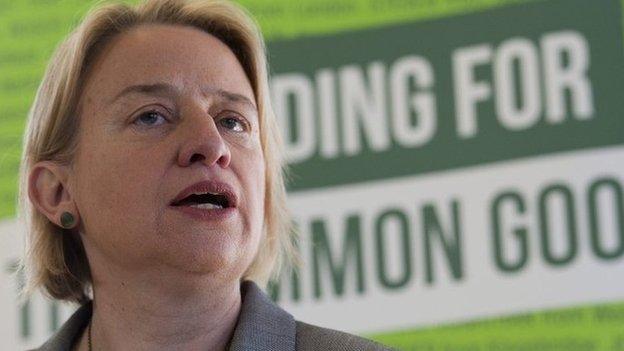Election 2015: How parties would reform Parliament
- Published
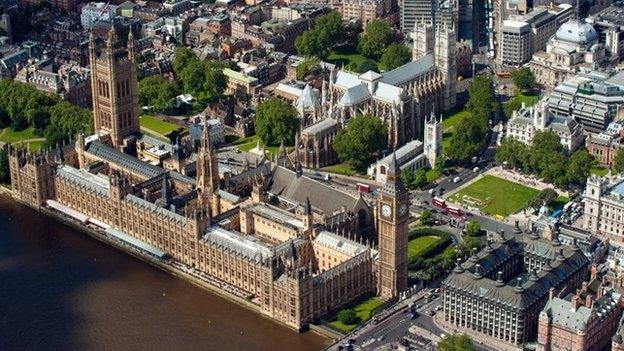
The thorny problem of parliamentary reform does not have voters pounding to the polling station - but it arguably provided some of the most closely-fought battles in the last Parliament.
And it could do in the next.
The Parliament of 2010-15 saw an attempt by the Liberal Democrats to reform the House of Lords and, by the Conservatives, to reduce the number of MPs to 600 via a shake-up of constituency boundaries. Both were challenges to the status quo.
This time, Liberal Democrat leader Nick Clegg has promised to drag Prime Minister David Cameron "kicking and screaming" to agree to Lords reform and a shake-up of the party funding system if he remains in a position of power after 7 May, according to MailOnline, external.
"All I'm signalling loud and clear here is if the Tories think they can have the boundary changes - which they want for nothing other than naked political advantage - but not clear up party funding, not introduce a smidgen of democracy to the House of Lords, they can just forget it," Mr Clegg said.
So who's promising what when it comes to parliamentary reform?

Conservatives
The Tory manifesto, external says significant reforms to the way Parliament works have already been carried out, including the election of select committee chairs, external, the creation of the Backbench Business Committee, external and the Fixed-Term Parliament Act, external.
In the next Parliament, the party says it will "address the unfairness of the current Parliamentary boundaries", by reducing the number of MPs to 600, "to cut the cost of politics and make votes of more equal value".
Conservative proposals would also see the line-by-line scrutiny of new bills reserved for MPs from the nations affected by the proposed legislation. A new grand committee of all English MPs - or English and Welsh MPs where appropriate - would also have to approve any legislation relating only to England.
The party also promises to:
ensure that the House of Lords fulfils its valuable role as a chamber of legislative scrutiny and revision. "While we still see a strong case for introducing an elected element into our second chamber, this is not a priority in the next Parliament," the party says
address issues such as the size of the House of Lords and the retirement of peers.

Labour
"Engagement in our democratic politics today is challenged by unprecedented levels of disengagement and cynicism," the party says.
"The House of Commons should be the beating heart of our democracy, but its power and effectiveness in scrutinising the Executive has deteriorated. And the shameful stain of the MPs' expenses scandal remains."
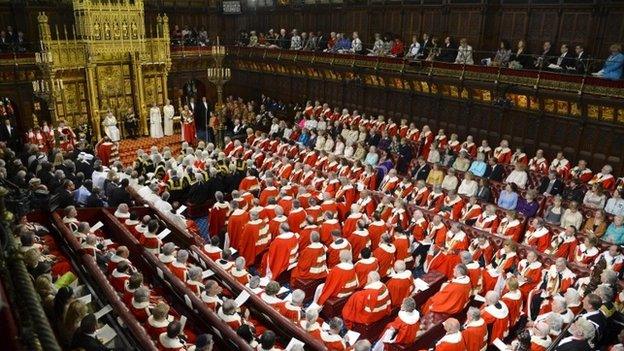
Labour wants to abolish the House of Lords and replace it with a Senate of the Nations and Regions
So what does Labour promise, external? The most eye-catching item on their agenda is reform of the House of Lords - to be replaced by an elected Senate of the Nations and Regions; and the removal of the remaining hereditary peers.
The party says that the Lobbying Act will be repealed and replaced with a more comprehensive statutory register of lobbyists. MPs would be banned from holding paid directorships and consultancies.
As devolution has continued to gather pace, the Union now needs to evolve, the party promises. "As a priority, we will set up a people-led Constitutional Convention to directly address this and to drive political reform of Westminster." It also pledges to consider options put forward by Sir William McKay, external of a committee stage (the third stage in the consideration of a bill) made up of English-only MPs.
Other proposals include:
"changing the way laws are made" to give backbench MPs a bigger say
a "People's Question Time" to allow members of the public the opportunity to directly question the prime minister on important issues
recall for MPs

Lib Dems
The Lib Dems, as coalition partners, also claim credit for reform of the parliamentary system in the last Parliament, as coalition partners.
Their manifesto states, external: "We have taken away the prime minister's power to call elections. We have improved Parliament with more powers for backbenchers and more internal democracy... but we were thwarted in some of our attempts to reform politics. When it came to reforming the House of Lords and giving citizens a stronger voice with fair votes, our proposals were blocked."
The party promises that reforming the House of Lords, starting from the proposals in the 2012 bill, external, will be a key plank of their proposals.
It also pledges reform of voting systems for elections to local government and Westminster to ensure more proportional representation.
Other reforms include:
prohibiting MPs from accepting paid lobbying work
strengthening the role of MPs in amending the Budget and scrutinising government spending proposals
making Parliament more family-friendly, and establishing a review to pave the way for MP job-sharing arrangements
implementing a House business committee to ensure that Parliament decides the parliamentary timetable, ending the "talking out" of private members' business
a full review of Parliamentary procedures, which should formally recognise individual political parties

UKIP
The party is unequivocal when it comes to parliamentary reform.
"With party whips wielding so much power, Parliament has grown supine and often spineless. Instead of challenging ministers, too many MPs simply do what their whips tell them. Parliamentary Questions are planted. Debates are rigged. Prime Minister's Question Time generates a lot of heat, but sheds little light," the manifesto trumpets, external.
The party promises to introduce the "Citizens' Initiative", which would see a national referendum every two years, as prompted by a petition with two million signatures. Petitions with more than 100,000 signatures would prompt a debate in the Commons.
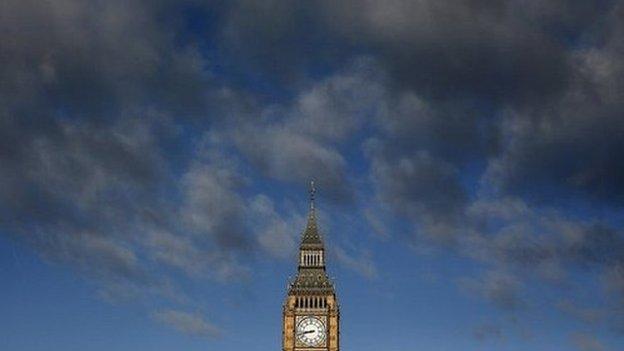
As the coalition government discovered, parliamentary reform is often difficult to achieve
UKIP promise a "Right of Recall" - whereby 20% of constituents could trigger a recall ballot. In addition, the party promises an Open Primaries Bill, with any voter able to select candidates.
Within Parliament itself the party promises:
confirmation hearings, where a Commons Select Committee votes to approve or veto the appointment of any new minister, senior civil servant or senior diplomat - and also quango chiefs
expenditure hearings, where the relevant Commons Select Committee would have the power to veto items on public spending plans, but not increase them
scrapping the Electoral Commission and Independent Parliamentary Standards Authority (IPSA) and merge their functions into a new Political Standards Authority.
Finally, the party says it will cut the cost of Westminster. It would reduce the size of the House of Commons and ensure constituencies across the country are of equal size, abolish government departments and reduce ministers.
It promises, among other cost-cutting measures, to cut the number of advisers and certain quangos, end overseas visits by politicians and stop subsidies to the bars and dining rooms at the Palace of Westminster.
"We anticipate investing savings made from cutting the cost of Westminster into a dedicated fund to contribute to the repair and maintenance of the beautiful and historic Palace of Westminster. The fabric of this building has been neglected," it says and puts the estimated cost of repairs at £3bn.

Green Party
"UK politics is rooted in the past and has lost touch with the present," the Green Party manifesto, external says. "Our Parliament looks back to feudal times rather than forward to democratic times."
A written constitution and proportional representation using the Additional Member System for parliamentary elections, as well as introducing a voting age of 16, are among the proposals.
Reform of the House of Lords is another pledge - the body would be fully elected, on a PR system, with members elected for only one fixed term of 10 years, with half the House being elected every five years.
Other proposals include:
repealing the Lobbying Act
aspiring to a 50:50 Parliament by 2025 with equal numbers of women and men
introducing recall referendums on MPs and other representatives if 20% of electors request it.

SNP
The party's manifesto, external promises to endorse a system of recall, working with other political parties to "deliver a system that gives real power to voters to remove MPs who have forfeited the trust of their electors".
It also supports the introduction of the Single Transferable Vote system for elections. The House of Lords would be scrapped under SNP plans and replaced with a fully elected second chamber.
In addition, it promises to support voting for 16 and 17-year-olds.

- Published15 April 2015
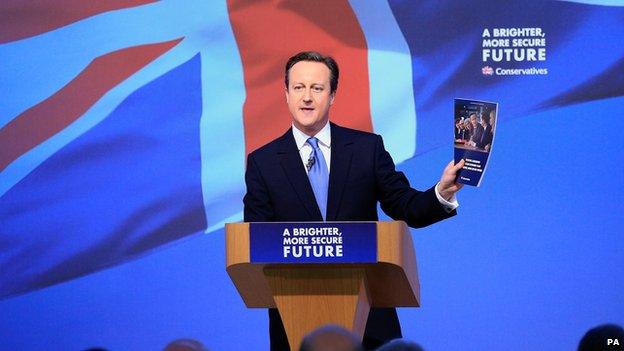
- Published14 April 2015
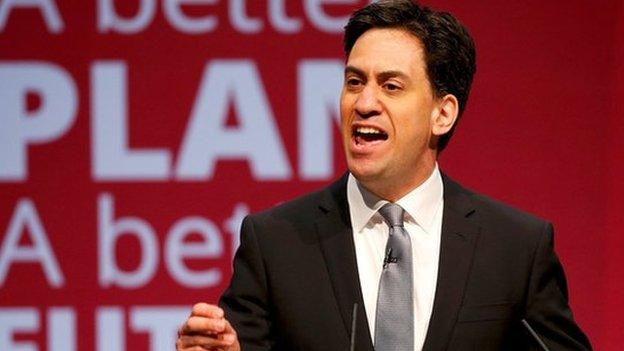
- Published15 April 2015
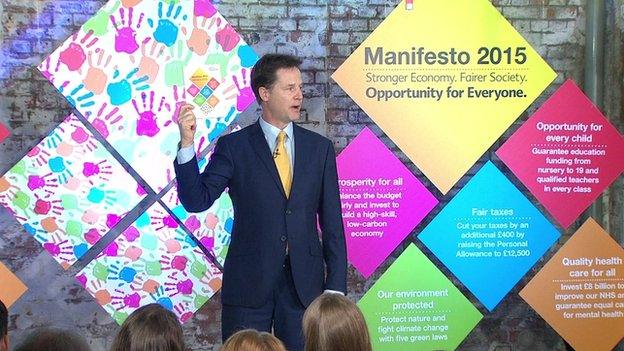
- Published15 April 2015
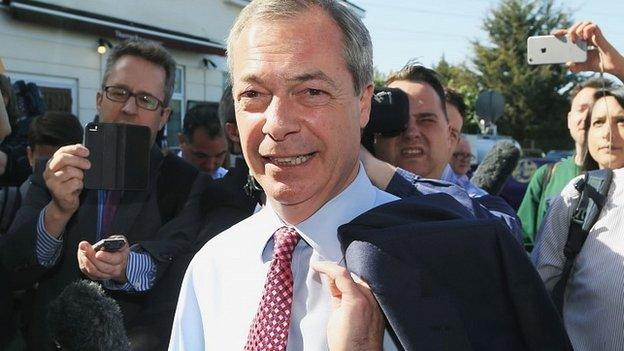
- Published20 April 2015

- Published14 April 2015
